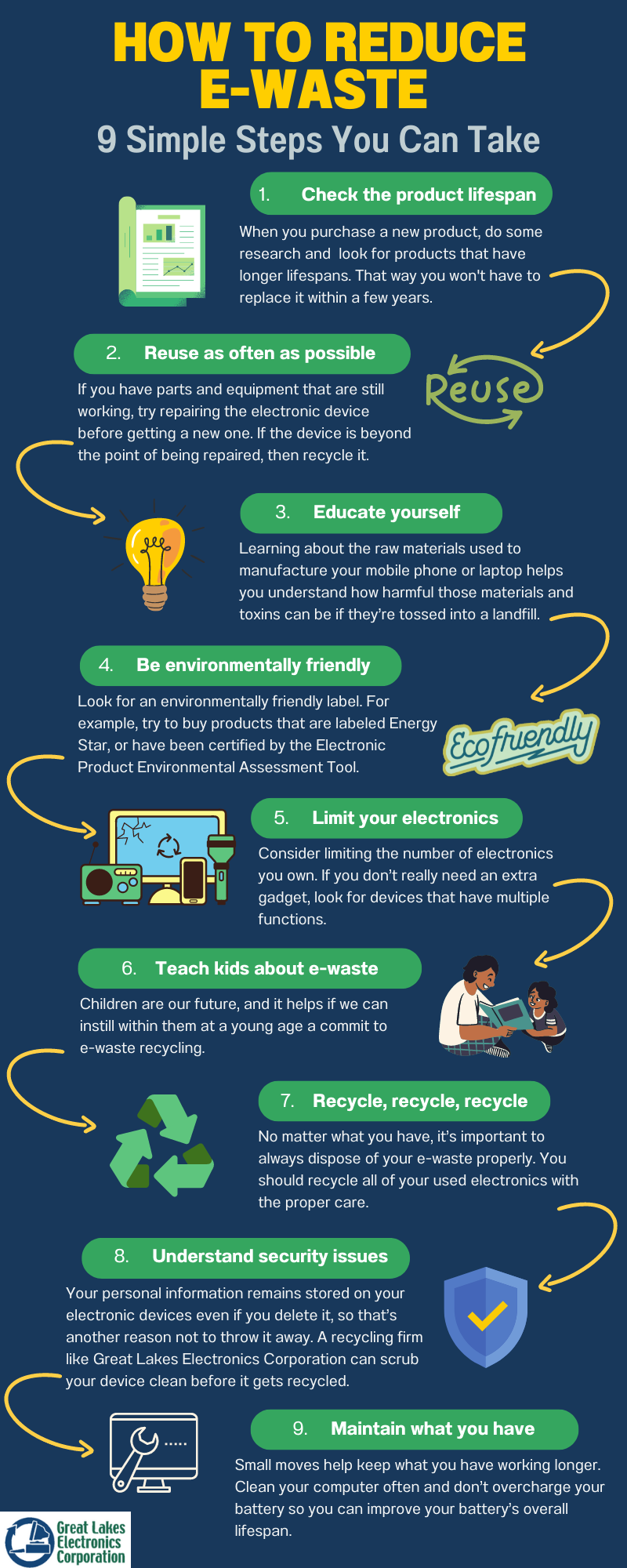Technology has improved so rapidly in the past few decades that today it’s hard to imagine what the world would be like without smartphones, GPS maps, laptops and other electronic devices.
At the same time, the skyrocketing amount of used electronics being discarded has left environmental activists, state and local governments, and even the United Nations asking serious questions about how to reduce e-waste. There are now more mobile phones around the world than the number of people, and there are 7.5 billion people in the world. Reusing the precious metals and plastics in old cell phones instead of mining for brand new materials can save the energy equivalent to power up to 24,000 U.S. homes for a year, according to estimates by the Environmental Protection Agency
The obvious solution to this has been recycling, which takes the parts within electronics, even the broken ones, that still have value and makes them available for new products. But the recycling rates for e-waste remain stubbornly low, which is why proponents of recycling are doing what they can to educate people about the long-term environmental and economic benefits of the approach.
There are actually very simple ways that all of us can help reduce e-waste, which is especially important at a time when our ever-growing reliance on electronics has led to e-waste becoming the largest growing waste stream worldwide.
All it takes is a commitment from you to avoid either throwing away your used electronics or hoarding them in your closet or desk drawer.
And the strategies for reducing e-waste should also include an awareness of your personal security: namely, making sure you delete all personal information from your electronic device so it doesn’t fall into the wrong hands.
What Are Ideas for How to Reduce E-Waste?
The challenge of reducing e-waste is something everyone needs to become aware of and make a commitment to doing, and it starts with understanding why we don’t want our used electronics continuously flowing into community landfills.
Electronic waste is defined as discarded electrical or electronic devices that can lead to human and environmental damage if they get put in landfills. These devices contain toxic chemicals like mercury and lead, and while they’re safe to use once they get placed in a landfill those toxins can seep out into the soil and water, contaminating both. If those toxins get into your drinking water then that presents a health hazard for you and your family.
And this is no minor challenge. As technology evolves and keeps improving our electronics, giving us incentives to get rid of our current models for the newest one, there’s been a tendency to just throw away these products. This has created a serious global e-waste problem.
Reducing e-waste isn’t just about eliminating those environmental risks. Minimizing e-waste also helps us to conserve resources and reduces the amount of energy we need to make these products; recycling parts within e-waste uses considerably less energy than creating new ones.
We can also help keep down the cost of new consumer goods by using recycled parts to make new products. This is a far less expensive proposition for manufacturers than having to go mining for virgin ore to make new metals. This means that the cost of making a new smartphone, or any other electronic device, goes down once manufacturers are able to access the parts they need from the recycling industry.
So this is a win-win proposition all around. The challenge, of course, is that not enough people know that e-waste can be recycled.
That’s why one of the strongest and most effective ways on learning how to reduce e-waste is to help spread the word about recycling.
If you’re someone that already recycles your e-waste then it’s great that you’re already doing your part to reduce waste. Now it’s time to go the next step and share your knowledge with other people — family, friends, neighbors, coworkers — who may not be aware of the hazards that e-waste poses.
If you have a family member or friend that just got a new smartphone or laptop, or simply plans on disposing of their old ones, talk to them about recycling it with an experienced recycling firm like Great Lakes Electronics Corporation, which can make the parts within them available to new users and manufacturers.
It’s also important to share your knowledge on the detrimental impact of throwing those devices away, or even hoarding them, this gives people a reason to act on your advice. If your friends and family members appreciate recycling and faithfully toss their plastics, cans and papers in municipal bins, let them know how easy it is to recycle e-waste. They can easily call a recycling firm, like Great Lakes Electronics Corporation, and do the same with their e-waste.
What Other Ways Are There for Reducing E-Waste

Since it’s very likely that our appetite for new electronics will only increase in the coming years, we all need to be ready for the possible explosion of new devices — and the similar rush to discard older models.
And there are strategies we can also follow to help reduce the amount of e-waste. They include:
- Check Product Lifespan. Do some research when you’re ready to buy a new product. Make sure it’s one that won’t break easily or become damaged shortly after you purchase it. In other words, look for products likely to have a much longer lifespan so you won’t need to replace it within a few years, or even months. It’s known that this is a common practice in the electronics industry; to make products with shorter life spans so more money can be earned in the long run when they break or malfunction.
- Educate yourself on what gets put into your electronics. Knowledge is power. Doing some research about the raw materials being used to manufacture your mobile phone or laptop helps you understand how harmful those materials and toxins can be if they’re tossed into a landfill. The more you educate yourself the more you can purchase items that won’t be harmful to the environment.
- Look for an environmentally friendly label. For example, see if the products you buy are labeled Energy Star, or have been certified by the Electronic Product Environmental Assessment Tool.
- Consider limiting the number of electronics you own. If you don’t really need an extra gadget, look for devices that have multiple functions
- Teach kids about e-waste. Children are our future, and it helps if we can instill within them at a young age a commit to e-waste recycling.
- Recycle, recycle, recycle. No matter what you have, it’s important to always dispose of your e-waste properly. That means recycling all of your used electronics, with the understanding that improperly disposing of e-waste is becoming more and more hazardous, particularly since the volume of e-waste has skyrocketed.
- Understand security issues. All of your personal information remains stored on your electronic devices even if you delete it, so that’s another reason not to throw it away. A recycling firm like Great Lakes Electronics Corporation can scrub your device clean before it gets recycled, so there is no opportunity for cyber thieves to get that information.
- Maintain what you have. Small moves help keep what you have working longer. Clean your computer often and don’t overcharge your battery so you can improve your battery’s overall lifespan.
Taking these moves and making those simple changes, and encouraging others to do the same, will help greatly reduce e-waste.
Conclusion
Great Lakes Electronics Corporation offers hardware Asset Management solutions that help companies do just that, offsetting the cost of office electronics no longer in use.
They can also help businesses identify the value of these items and reclaim some of their initial investment.
And the same is true for individuals who have used or old electronics they no longer want or use.
Great Lakes Electronics Corporation provides full, single-source and complete solutions for large organizations, small to midsize companies, government agencies, schools, and nonprofits. They can help you recycle in the Green Way.
Call us today at 888-392-7831 to request a quote.

